#47: Mind Games by John Lennon
City: Montreal, PQ
Radio Station: CJMS
Peak Month: February 1974
Peak Position in Montreal ~ #2
Peak position in Vancouver ~ #10
Peak Position on Billboard Hot 100 ~ #18
Peak Position on Australian Singles chart ~ #8
YouTube: “Mind Games”
Lyrics: “Mind Games”
John Winston Lennon was born in Liverpool in 1940. His middle name was after Britain’s current Prime Minister Winston Churchill, during World War II. In 1957, Lennon wrote his first song titled “Hello Little Girl”. It became a Top Ten hit in the UK in 1963 for the Merseybeat band the Fourmost. He became part of the Quarrymen, along with Paul McCartney, George Harrison and Stuart Sutcliffe, each on guitar. The latter was replaced by Ringo Starr, who was a drummer, after the band had already been renamed the Silver Beatles and finally the Beatles. In the Sixties, Lennon and McCartney became the most successful singer-songwriting team for the Fab Four (as the Beatles were known).
With the Beatles, John Lennon was a celebrated pop singer as part of Beatlemania and the British Invasion. He co-wrote many number-one hits by the Beatles, starting with “Love Me Do” in 1962. Other hits followed between 1963 and 1966 by Lennon and McCartney which include “From Me To You”, “She Loves You”, “I Want To Hold Your Hand”, “Can’t Buy Me Love”, “A Hard Day’s Night”, “I Feel Fine”, “Eight Days A Week”, “Ticket To Ride”, “Help!”, “Yesterday”, “We Can Work It Out” and “Paperback Writer”.
In March 1966, John Lennon had an an interview with Evening Standard reporter Maureen Cleave. Lennon commented, “Christianity will go. It will vanish and shrink … We’re more popular than Jesus now—I don’t know which will go first, rock and roll or Christianity. Jesus was all right but his disciples were thick and ordinary.” The comment was yawned at in Britain, but it caused a furore when it was reported in Datebook’s August edition in America. Suddenly there were protests that involved the burning of Beatles records. The Ku Klux Klan staged protests against the Beatles and nailed their albums to a wooden cross. There were also death threats against Lennon. This development was a catalyst for the band’s decision to cease touring. On August 19th two concerts were scheduled in Memphis, Tennessee. Both were cancelled by the city council who wouldn’t let municipal facilities be used by people who were trying to “ridicule anyone’s religion.”
Though the Beatles no longer performed in concert, they kept having more hit singles. These included Lennon-McCartney penned hits “Penny Lane”, “All You Need Is Love”, “Hey Jude”, “Get Back”, “Come Together”, and “Let It Be”. The band also had chart-topping albums. Among them were Meet the Beatles!, Twist and Shout, A Hard Day’s Night, Rubber Soul, Revolver, Sgt. Pepper’s Lonely Hearts Club Band, Magical Mystery Tour, The Beatles “The White Album,” Abbey Road, and Let It Be.
While still with the Beatles, John Lennon married Yoko Ono on March 20, 1969, in Gibraltar. They spent their honeymoon in Amsterdam having a week-long bed-in for peace. Subsequently, they had another bed-in at the Queen Elizabeth Hotel in Montreal in late May-early June 1969. While they were staying in the hotel they recorded “Give Peace A Chance”. The song which was recorded with friends was later credited to the Plastic Ono Band. After the Beatles released “The Ballad of John and Yoko”, Lennon and Ono decided it would be better to form their own band to release their newer, more personally representative art work, rather than release the sound material as the Beatles. They formed the Plastic Ono Band.
On September 13, 1969, the Plastic Ono Band held a Live Peace Concert at the Toronto Rock and Roll Revival at Varsity Stadium. During the day the audience was treated to performances by Junior Walker and the All Stars, Chicago Transit Authority, Bo Diddley, Chuck Berry, Tony Joe White, Alice Cooper backing Gene Vincent, Cat Mother and the All Night News Boys, Jerry Lee Lewis, Little Richard, and The Doors.
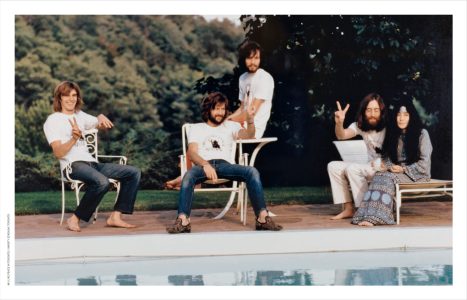
The Plastic Ono Band chilling out before Live Peace Concert in Toronto
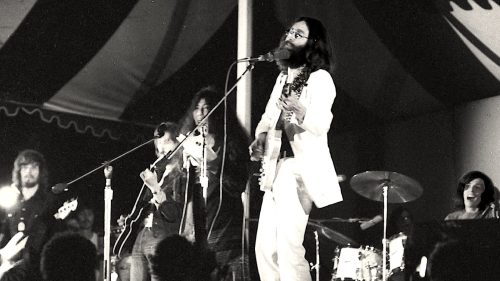
Plastic Ono Band: Live Peace Concert in Toronto
On December 15, 1969, the Plastic Ono Band performed a concert at the Lyceum Ballroom in London. This included a live performance of “Cold Turkey”. The live music from the concert became part of a part-live/part-studio album released in June 1972 titled Some Time in New York City.
In January 1970, the Plastic Ono Band released a single titled “Instant Karma”. The song invited listeners to “get yourself together,” a phrase used at the time among hippies. Lennon also asked about the purpose of life: “Why in the world are we here? / Surely not to live in pain and fear.”
The Beatles split in 1970 after the release of the Let It Be album. Paul McCartney told Howard Stern in 2018 that John Lennon walked into a room one day in 1970 and announced that he was leaving the Beatles.
In March 1971, the Plastic Ono Band released “Power To the People”. It was a song about the need for people to “get on your feet… and into the street” if they “want a revolution.” The lyrics spoke of people working for insufficient wages: “A million people working for nothing/you better give them what they really own…” As well, he addresses his “comrades, brothers,” and invites them to ask themselves “How do you treat your own woman back home?” The chorus invites people everywhere to sing “Power to the people.”
In the fall of 1971, John Lennon released his album Imagine, and the title track from the album “Imagine”. The best-selling single of his solo career, the lyrics encourage listeners to imagine a world of peace, without materialism, without borders separating nations and without religion.
In December 1971, the Plastic Ono Band released “Happy Xmas (War is Over)”. The song endorsed social unity and peaceful change. It advanced that ordinary people have more power than they may realize, and that they can put a stop to wars (like that in Vietnam at the time) if they want it (demand it) from politicians, generals.
In late 1973, Lennon released the title track from Mind Games.
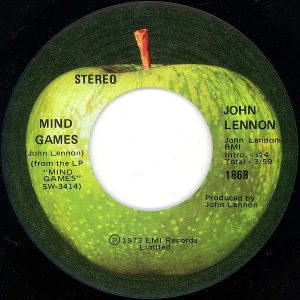
John Lennon wrote “Mind Games”. This eloquent track evoked lingering hippie sentiments mixed with the evolving mysticism of the early 1970s. In keeping with the original theme, the lyrics advocate unity, love, and a positive outlook. According to Billboard, the song asserts “that positive thoughts are the answer to happiness. The lyric “YES is the answer” is a nod to his wife Yoko Ono’s art piece that brought them together originally.”
“Mind Games” was inspired by a book John Lennon read called Mind Games: The Guide to Inner Space. Written by Robert Masters and Jean Houston, it explains how we can improve ourselves on various levels by playing tricks on our minds; the song is really about making yourself a better person. Originally, Lennon began writing a song called “Make Love Not War,” which had a strong antiwar sentiment. Eventually, he abandoned that theme and wrote an entirely different lyric to the melody which became “Mind Games”.
“Mind Games” peaked at #1 in Chicago, Dayton (OH), Youngstown (OH), and Cocoa Beach (FL), #2 in Montreal, #3 in Colorado Springs (CO), Corpus Christi (TX), and Minneapolis/St. Paul, Indianapolis (IN), #5 in Toronto, Winnipeg (MB), and Omaha (NE), #6 in Boston, Honolulu, Denver, and Tucson (AZ), #7 in Hamilton (ON), Columbus (OH), Missoula (MT), Cleveland, Erie (PA), Lynchburg (VA), and Phoenix, #8 in Ottawa, Worcester (MA), Sioux Falls (SD), Fort Worth (TX), and San Bernardino (CA), #9 in Kingston (ON), Louisville (KY), Salt Lake City, and Wichita (KS), #10 in Vancouver (BC), Miramichi (NB), Harrisburg (PA), and West Palm Beach (FL), and #11 in Allentown (PA), Reading (PA), Los Angeles, and Sarasota (FL).
Internationally, “Mind Games” peaked at #5 in Italy, #8 in Australia, #11 in Canada, #16 in the Netherlands, and #18 on the Billboard Hot 100.
In 1974, John Lennon had a number-one hit with John Lennon had solo hits that include “Whatever Gets You Through the Night”, and a Top Ten hit with “#9 Dream”. Both were from the album Walls and Bridges.
After an absence from the recording studio, Lennon and Ono had released the album Double Fantasy in November 1980. On December 8, 1980, Lennon autographed a copy of Double Fantasy for Mark David Chapman before leaving The Dakota apartment building at 1 West 72nd Street, with Ono for a recording session. After the session, Lennon and Ono returned to the Dakota in a limousine at around 10:50 p.m. (EST). They left the vehicle and walked through the archway of the building, just steps from Central Park in Manhattan. Chapman then shot Lennon twice in the back and twice in the shoulder at close range. John Lennon died by the time he arrived at the Roosevelt Hospital at 11:15 p.m. that night.
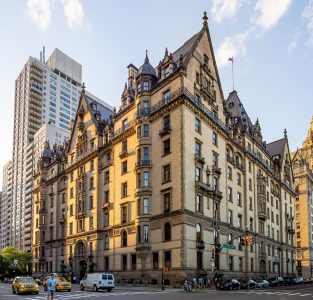
The Dakota, 1 West 72nd Street, New York City
The FBI admitted it had 281 pages of files on Lennon, but refused to release most of them on the grounds that they contained national security information. Unclassified memos, from the FBI’s Hoover to White House chief of staff H.R. Haldeman, showed improper political interference in an immigration proceeding while Lennon was seeking to obtain a green card. The story is told in the documentary The US vs. John Lennon.
From the Double Fantasy album came the number-one hits “”(Just Like) Starting Over” and “Woman”. A third single from the album, “Watching the Wheels”, concerned public reaction to Lennon being a househusband from 1975 to 1980. In 1984, a posthumous single “Nobody But Me”, was a Top Ten hit in a half dozen nations. The single was from the 1984 album Milk and Honey.
May 26, 2025
Ray McGinnis
References:
“John Lennon Died 35 Years Ago Today: Read Original Associated Press Story,” Billboard, December 8, 2015.
Johnathan Cott, “John Lennon: The Last Interview: Three Days Before he Died, John Lennon Talked with ‘Rolling Stone’ for Nine Hours. For the First Time, we Present this Extraordinary Interview,” Rolling Stone, December 23, 2010.
“Interview: John Lennon and Ringo Starr in Los Angeles,” Los Angeles Times, August 23, 1964.
Robert Masters and Jean Houston, Mind Games: The Guide to Inner Space, (Doubleday, 1972).
Jann S. Wenner, “Lennon Remembers, Part One,” Rolling Stone, January 21, 1971.
Barry Miles, Beatles in their Own Words, Putnam Pub. Group, 1978.
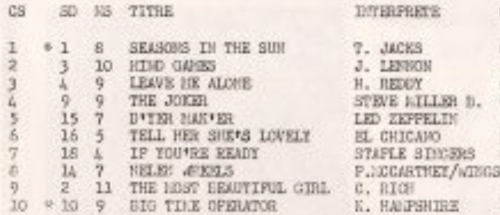
CJMS 1280-AM Montreal (PQ) Top Ten | February 1, 1974

Paul McCartney’s memory must have been a little off regarding John Lennon’s declaration to the other Beatles that he wanted to leave the band. It was not in 1970 but, rather, September 20/1969. Probably no coincidence that it came a mere week after John, Yoko and the Plastic Ono Band performed at the Live Peace Festival in Toronto.
Despite him being terrified before taking the stage, John was buoyed by the audience reaction and perhaps realized he could enjoy a solo career.
Thanks for that clarification. No doubt in an interview nearly fifty years later, Paul McCartney’s memory was off by some months (including the year).